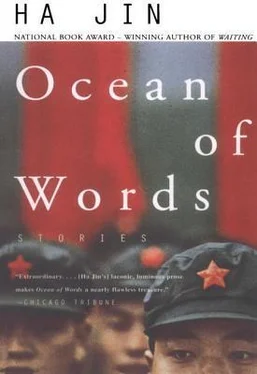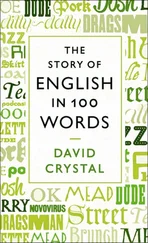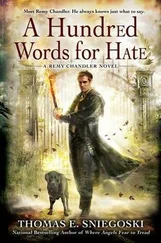“He’s very good,” Shi Wei said.
“Of course, Shenyang always has the best hands,” Chief Jiang said, returning the call. This was their first direct communication with the Headquarters of Shenyang Military Region. In no time the two stations got in touch. Jiang telegraphed that from now on they would keep twenty-four-hour coverage.
“Understood. So long,” Shenyang replied.
“So long,” Jiang tapped. He turned off the transmitter, but left the receiver on. “Shun Min, it’s your turn now. Little Kang will take over in the evening.”
“All right.” Shun moved his chair close to the machine.
Though the middle-aged chief called him Little Kang, to the other soldiers Kang was Big Kang. His whole person was marked by abnormal largeness except for his voice, which was small and soft. Whenever he spoke, he sounded as though he was mumbling to himself. If his neck were not so long, his comrades would have believed he had suffered from the “big-joint” disease in his childhood. His wrists were thick, and his square thumbs always embarrassed him. But everybody was impressed by the beautiful long lashes above his froggy eyes.
After dinner Kang replaced Shun. The evening shift was not busy. Since all news stations broadcast at dusk and there was too much noise in the air, few telegrams were dispatched or received during these hours. Kang’s task was to answer Shenyang’s call every hour, and for the rest of the time he had to attend to the receiver in case an emergency arose. Having nothing else to do, he opened the fanlight and watched the night. Gray streaks of clouds were floating rapidly beneath the crescent moon and the glimmering stars. In the air there was a mysterious humming, which seemed to come from the constellations. Except for the swarms of lights in Hutou Town, it was dark everywhere. Even the silhouette of those mountains in Russia had disappeared.
Cold wind kept gushing into the office; Kang closed the fanlight and sat back on the chair. Again, nothing could be seen through the window, on whose frosty panes stretched miniature bushes, hills, caves, coral reefs. He picked up a pencil, turned over a telegram pad, and began drawing pictures. He drew a horse, a cow, a dog, a pig, a rooster, a lamb, a donkey, and a hen leading a flock of chicks.
After taps at nine, the quiet grew intolerable. If only he could have something interesting to do. In one of the drawers there was a volume of Chairman Mao’s selected works and a copy of Lenin’s What Is to Be Done? , which Chief Jiang would browse through at night, but these books were too profound for Kang. He missed the picture stories he had read when he was a boy. Those children’s books could no longer be found anywhere, because they had been burned at the beginning of the Cultural Revolution. Kang took out his tobacco pouch and rolled a cigarette. Smoking was the only way to prevent himself from dozing off. Then he stretched his legs, rested his feet on the table, and leaned against the back of the chair as if lounging on a sofa. Soon the small office turned foggy.
Shenyang began to call at ten sharp. Kang turned on the transmitter and was ready to reply. It was another radio operator at the other end now. The signal was fluctuating at a much faster speed, approximately 130 numerals a minute. Because of the noise, the dots and the dashes didn’t sound very clear, though they were distinguishable.
“Please answer,” it ended.
Immediately Kang started to call back. His large hand held the button of the sending key and pounded out the letters one after another. He was a slow hand and could tap only eighty numerals a minute. But his fingers and thumb were powerful — whenever he telegraphed, the key with its heavy steel base would move about on the table. Holding the base with his left hand, he was repeating the reply signal in a resolute manner. His thick wrist was moving up and down while a little red light was flashing nervously at the top of the transmitter.
The operator at the opposite end did not hear Kang and resumed calling. Now there was less noise in the air and the signal became distinct. The call sign, composed of eight letters, was repeated again and again; it formed a crisp tune, flowing around and around. Kang pricked up his ears. This must be the chief of the station. He had never met such an excellent hand. There were automatic machines that could produce 180 numerals a minute clearly, but those dead instruments always sounded monotonous. They didn’t have a character. The more you listened to them at night, the more likely you would fall asleep. But this fellow was one of those “machine defeaters.”
“Please answer,” the other side asked again.
Once more Kang went about calling back. Affected by the dexterous hand at the other end, he tried hard to speed up. The chair under his hips creaked while he was struggling with the bakelite key button, which turned slippery in his sweating hand.
Unfortunately this was a bad night. The other side simply could not find him. It called him time and again; Kang replied continually, but they could not get in touch. Forty minutes passed to no avail. By now, the other operator had become impatient. The melodious signal gradually lost its rhythm and flowed so rapidly that the letters were almost indistinguishable. It sounded like raindrops pattering on metal tiles. Patient as he was, Kang began to worry.
Around eleven, the telephone suddenly rang. Kang picked up the receiver and said, “Hello.”
“Hello,” a tingling female voice said. “This is the Military Region Station. Wake up, comrade. Have you heard me on the machine?”
“Ye-yes.” Kang paused with surprise, his heart kicking and his throat tightening. Who could imagine a woman would call you on the border at night? “I–I’ve heard you,” he managed to say. “I ne-never dozed off. I’ve been calling you all the time.”
“Sorry, don’t take it to heart. I was teasing you. Shall we switch to the second set of frequencies?” She sounded so pleasant.
“All righ-t.” His tongue seemed not his own.
“Bye-bye now, meet you on the machine.”
“Bye.”
She hung up. Kang was dazed, still holding the receiver. The sweet voice went on echoing in his ears, “Sorry, don’t take it to heart.…”
The call sign appeared again. This time it repossessed its elegance and fluency, but to Kang every dot and dash was different now, as though they were tender, meaningful words the young woman sent to him alone.
“Switch frequency please,” she ended.
Kang jerked his head and rushed to look for her on the new frequency. Without much effort, he found her again. His body grew tense as he became engrossed in the sways and ripples of the heavenly melody. How wonderful to work with a woman at night. If only she could call him like this for an hour. But she stopped and asked, “Please answer.”
Kang’s hand began to tremble. It settled on the sending key like a small turtle, shaking out every letter brokenly. He cursed his hand, “Come on, you coward! This is not a battle yet.” He wiped his wet forehead with a telegram sheet.
What a pity. She heard him in less than a minute and replied promptly: “No business. Meet you at twelve o’clock. So long.”
“So long.” Kang had to agree, because it was a rule that an operator must never transmit an unnecessary dot or dash. The longer you stayed on the air, the easier it was for the Russians to locate your position.
Kang felt at a loss. He raised his head to look at the clock on the wall — eleven-ten, so he would meet her in fifty minutes. His imagination began to take wing. What was her name? How stupid he was, having forgotten to ask her. How old was she? She sounded so young and must have been around twenty. A good person, no doubt; that pleasant voice was full of good nature. What did she look like? Was she beautiful? Well educated? Intelligent? That voice told everything — all the best a woman could have. But what did she look like exactly? Tall and slim, with large black eyes? Of course he could not find out much about her through only one meeting. It had to take time. He believed that eventually he would get to know her well, because from now on they would meet every night.
Читать дальше











